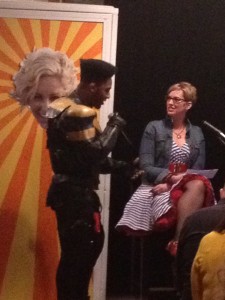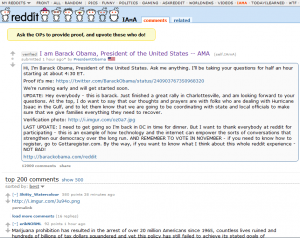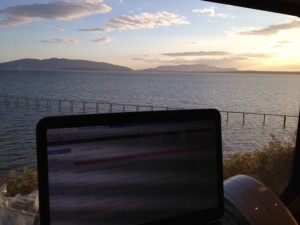I couldn’t resist. I needed to check out the Town Hall meeting to discuss the SODO Arena Proposal. I had no idea what to expect.
The Town Hall was hosted by King County Councilmember Bob Ferguson, and Seattle City Councilmember Mike O’Brien. I don’t have any previous knowledge of these two gentlemen, so I was able to enter this with an open mind.
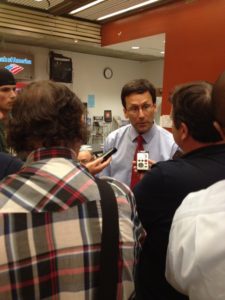
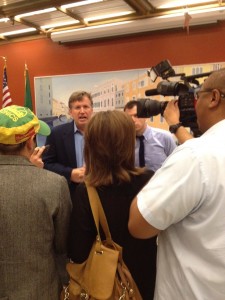
In a word, the event was fascinating. I now understand why so many dumb decisions get made in City Council. You see, there are a lot of very old, very opinionated, very uninformed people who attend these meetings as a hobby. They have the ear of the Councilmembers. They ask questions that are irrelevant, obtuse, confusing and just plain non-sensical. But they show up, and their voice gets heard over silent oppositon and common sense.
However, this Town Hall was filled with 150-200 Pro-Arena supporters (to go along with maybe 50-75 against). And thanks to Sports Radio KJR, 710Sports.com, and SportsPressNW.com informing their listeners and readers with intelligent facts and data over the last few months, the Pro-Arena members of the crowd came across way more informed, way more intelligent and way more reasonable than those against it. In some circumstances you expected the Anti-Arena person with the microphone to follow up with, “And how do we know they REALLY landed on the moon? Were you there to see it?”
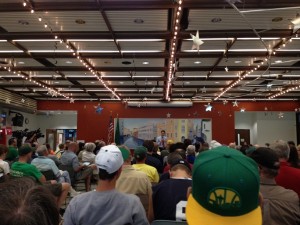
That being said, it’s clear that while the arguments against the proposal aren’t 100% sound, they are loud enough to potentially kill the deal. And with the Seattle Mariners, Seattle Times, and Port of Seattle working as hard as they can to stop it, you can’t just assume the deal will get passed because it makes sense. There are clearly a lot of politics in the way. If you care at all, I urge you to attend the important meeting on July 19.
But I’m not an opinion writer and I’m not an expert on this subject. so I tried as best I could to transcribe the 26 questions that the crowd was able to ask Councilmembers Ferguson and O’Brien. And I will say I was quite impressed with the two of them. I thought they were reasonable, well informed and bright.
I captured the main points and tried to stay unbiased in my transcription. I couldn’t keep track of which questions Ferguson was answering and which ones O’Brien was handling, so their replies are just mashed together. Here are all the questions and answers they went thru in about 70 minutes, in order:
1. What is wrong with the Key Arena? Why would we build a new arena in an industrial area?
The Key Arena doesn’t work for NBA basketball. It also doesn’t work for concerts. The proposal is to build a new arena in the stadium district. We do have to look at what effect that will have on our industrial area.
2. So is this deal for a stadium in SoDo or nothing?
For this proposal, yes. Chris Hansen has made it clear he’s not interested in building anywhere else.
3. Have the football and baseball stadiums worked out?
Yes (applause). However, we will have to ask, “Does the stadium reach a tipping point?”
4. Is 18,000 people at night a real traffic issue?
We’re analyzing. Independent reviews are being done to make decision based on data.
5. I’m not a sports fan, but why can’t you use the same footprint of the KeyArena? We could bore straight down and dig out the ground and go as deep as you wanted to. (Crowd: murmurs and disbelief)
People at city have looked at this. Not viable according to experts. I’m not an expert so I will have to rely on what the experts say.
6. Initiative I-91 passed to make sure we have no new taxes on sports arenas. Also, how will you backfill the lack of events at Key Arena if a new arena is built?
The City operates Key Arena at break even. We already wonder how long we will be able to continue to do so without giant improvements. We don’t have a plan to support those kind of improvements. This arena plan is also to support Key Arena. If Seattle is awarded an NBA team, it would need to play for 3 years in an improved Key Arena while new arena is being built. Mr. Hansen has committed to making improvements to Key Arena in this case, and those improvements would remain after the team moved to the new arena.
7. How can you submit to this kind of blackmail from a private property owner when the Port of Seattle is so important to us? (Crowd venomously boos this older woman.)
I hear your point on port. This is not blackmail, its a choice. Reasonable minds can disagree. The Port’s point is important. Reviews will be done, traffic and economic impacts. This isn’t an either/ or situation. We are hoping to get data to figure out how to make it additive.
8. I am a Building trades member. I’ve heard that port will stay quiet if they get their overpass built. It’s them doing the blackmailing. (applause)
We are all working on the (Lander St.) overpass issue. It would cost $200m to build. Mr. Hansen understandably doesn’t want to pay for it. If the Lander St overpass is most important issue, we will look at it. Impact of construction jobs can’t be understated.
9. Can you walk us thru the legal process of the MOU because it suddenly appeared without the knowledge of the public.
2 execs worked with Mr. Hansen and the Council was aware of what was going on. This wasn’t a backroom deal. The Mayor and the County Exec have the authority to work on this without a committee. That’s why we elect Execs.
10. A) Can we stop talking about Key Arena? (applause). B) As someone who lost a job, I understand why the port complained. But traffic studies show there’s no traffic after 4pm. Why isn’t the port on board with this?
There can be collaboration. Disagreements now can be healthy and there may be chance to make changes. Collaboration is taking place.
11. Has anyone seen any data from anywhere that backs up the Port’s claim that jobs would be lost?
(Raucous applause from crowd) No answer. (Note: Every time this question was asked, the Councilmembers tippy-toed around the obvious answer they didn’t want to say out loud. That answer is – No, there is no data. The Port is currently scrambling to pull together a report. According to a source I trust, the port is not exactly nimble, so getting a study together at this kind of pace is causing them all kinds of hassle.)
12. In economic terms the Key Arena is sunk cost. Key arena can make $1, new arena can make $2 . Key arena is an asset now. That property can be made into anything now. But this issue should go away. (No question asked)
13. The Martin report says east side of port will be rendered useless. (No question asked)
14. How will you protect jobs of current Key Arena employees?
We have to look at how the deal will be set up. We will look into ways that this is not something that would hurt Key Arena employees. It makes sense to give Key Arena employees first shot at jobs at new arena.
15. A Sports palace should fund itself. When the UW wanted us to build them a Sports Palace we voted it down and they got it built with tax dollars anyway. (Note: That statement was incorrect. The UW raised the money themselves.) We shouldn’t raise taxes to build a new sports palace. When the Panama Canal is expanded, 1/2 the Port’s traffic will disappear.
There should be no absolutes on these issues. This isn’t a tax it’s a bonding issue. (Note: No one seemed to understand the Panama Canal reference.)
16. Where does the NHL fit in? What are the safeguards if we don’t get an NHL team?
It’s not accurate to say that the arena deal needs the NHL. Mr. Hansen is focused on NBA. Potential comes down road for NHL. Likely that in the 3 years of arena being built they would pursue a NHL team.
17. Please raise hands because our elderly friends are raising theirs better than us….. It seems clear that the port is blackmailing us. They say the arena will cost 100,000 jobs. Where are they getting these facts?
We shouldn’t speak negatively about port, by insinuating they are blackmailing anyone. The decision should be grounded in real data. We’re asking for this analysis and won’t consider a deal without seeing this data.
18. Note: Jason Rubenstein then brought the house down with a fantastic monologue filled with facts, figures and emotion that came so fast an furious I couldn’t keep up. Well done, Jason. Well done indeed.
19. I’m hoping the council will consider what jobs will look like in the future arena. I don’t want to lose my family wage job in Key Arena.
The MOU states that jobs in new arena will be family wage jobs. No one is looking to outsource low wage contractors to replace current Key Arena employees.
20. The seawall repair will go to vote in November. The Kingdome was a perfectly good building (Crowd laughs in hysterics). If the seawall needs to go to a public vote, why can the council make the decision on the arena? After all, a seawall is a necessity, and a stadium is not. (Note: this man was 85 years old, so I don’t want to bash him too hard on the Kingdome comment.)
The Council can issue bonds, which are funds we need to pay back in some way. There’s no revenue model to pay back seawall bonds, so we have to raise taxes to pay it back. Thus, it has to go to vote. Arena bonds are not reliant on taxes. Now, we do need to make sure we have the security to cover the bonds, but we don’t need tax dollars to pay them back.
21. Is the city evaluating the revenue the right way? The I-91 issue.
Onsite revenues and land value issues are hard to forecast. (I’ll admit I got a little confused at the response.)
22. Port of Seattle is responsible for 194k jobs. They are the widening Panama Canal. I’m concerned about traffic.
(Note: Both the Councilmembers were perplexed by the non-question / unclear point the person was trying to make here, so they ignored it and moved on. It appears people against the arena are really concerned about this Panama Canal issue.)
23. The Stadium district is in the most transit rich area in the Pacific NW, and the perfect place to move people in and out of a stadium WITHOUT THEIR CARS. What’s the hangup here? (applause)
Relatively few people take mass transit to sporting events. While there is good transit, there will be 6000 cars going to games. We need to examine the issue carefully.
24. The NBA didn’t treat us well. How much money does the NBA have and why can’t they put the money up for a new arena?
If you are asking why the NBA won’t build an arena for us, well, that issue really isn’t on the table. I opposed the last arena deal because all residents of King County would be paying taxes. This deal is different. We have plenty of private-public projects. I don’t take absolutes. I don’t believe there can’t be public involvement in an arena. There is a significant investment from private citizens in this deal. I am sympathetic to public investment, but there is city by city competition across the country and public investment in stadiums is part of that. There are things to work on.
25. I live in West Seattle. There is so much construction these days. I can’t get home when I want to. Is a stadium the only thing that can go into the stadium district? Why can’t the stadium go in the Rainier Valley?
This deal is for an arena in the stadium district. That’s the only place being considered in this proposal.
26. Why is deal different for one team (NBA only) than two teams (NBA and NHL)?
The ownership group is shooting for 2 teams. If they only get one team, then the city and council are only willing to put $125MM in bonds up, not $200MM. We’re hoping to get a win-win here.
Was anyone else there to check it out? Would love to get your slant.

